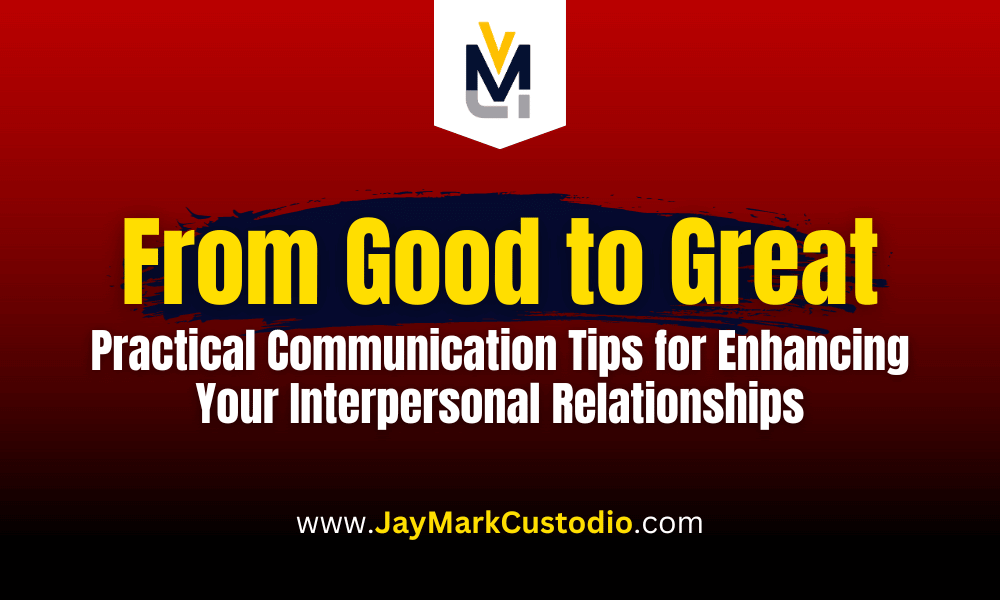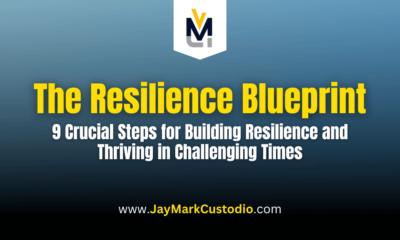Productivity System
From Good to Great: Practical Communication Tips for Enhancing Your Interpersonal Relationships

Hey there, classmate!
In this fast-paced world, the ability to communicate effectively is an essential skill that can significantly impact your personal and professional life.
As such, in this blog post, I am excited to share some practical tips and techniques to help you master the art of effective communication.
Table of Contents
My goal is to equip you with the tools you need to communicate effectively in any situation and help you build stronger relationships in your personal and professional life.
1. The Importance of Communication:
Effective communication is the cornerstone of any thriving relationship. It provides us a means to connect with others, share our thoughts and emotions, and convey our ideas to the world.
As a fellow student, you are already well aware of the critical role of good communication skills in various aspects of your life. (READ ALSO: Mastering the Art of Versatility: Exploring 9 Different Types of Skills)
Whether in your personal relationships, academic pursuits, or professional endeavors, communicating effectively is essential for success.
By mastering the art of communication, you can build stronger relationships, resolve conflicts, and achieve your goals with greater ease and confidence.
Effective communication is critical in every aspect of our personal and professional lives.
Here are some reasons why effective communication is so important:
1. Building and maintaining relationships: Communication is the foundation of any healthy relationship. By communicating effectively, we can build trust, express our thoughts and emotions, and resolve conflicts.
2. Achieving success in the workplace: Effective communication is crucial for success in the workplace. It allows us to collaborate with others, share ideas, and work towards common goals.
3. Advancing in your career: Good communication skills are highly valued by employers and can help you stand out in the workplace. Effective communication can help you network, negotiate, and build strong professional relationships.
4. Personal growth: Effective communication can help us develop self-awareness, empathy, and emotional intelligence. By communicating effectively, we can better understand ourselves and others, and continue to grow and develop as individuals.
5. Resolving conflicts: Communication is critical to resolving conflicts. By communicating effectively, we can identify the root cause of the conflict, express our perspective, and work towards a mutually beneficial resolution.
Effective communication is essential for building strong relationships, achieving success, and personal growth. By mastering the art of communication, we can enhance our lives and the lives of those around us.
2. Types of Communication:
Communication takes many forms, and each type has unique characteristics and methods.
Verbal communication involves spoken words, while nonverbal communication encompasses body language, facial expressions, and other nonverbal cues.
On the other hand, written communication involves using written words, such as letters, emails, and reports.
Finally, visual communication involves using images, graphics, and other visual aids to convey a message.
Each type of communication has its strengths and limitations, and using them effectively is essential for effective communication.
By understanding the unique characteristics and methods of each type of communication, you can choose the most appropriate approach for your specific needs and achieve your communication goals with tremendous success.
There are several types of communication, including:
1. Verbal communication: This type of communication involves the use of spoken words to convey a message. Verbal communication can take many forms, such as face-to-face conversations, phone calls, or video conferencing.
2. Nonverbal communication: Nonverbal communication involves communicating without spoken words. This type of communication can include body language, facial expressions, and gestures.
3. Written communication involves using written words to convey a message. This type of communication can take many forms, such as emails, letters, memos, or reports.
4. Visual communication: Visual communication involves using images, graphics, and other visual aids to convey a message. This type of communication can include charts, diagrams, or videos.
Each type of communication has unique characteristics and methods; using them effectively is essential for effective communication. By understanding the different types of communication, you can choose the most appropriate approach for your specific needs and achieve your communication goals with tremendous success.
3. Common Barriers to Communication:
Effective communication can be hindered by various barriers preventing you from connecting with others and conveying your message.
These barriers can arise due to differences in language, culture, and emotions and can impact your ability to communicate effectively.
For instance, language barriers can make communicating with people who speak a different language challenging. At the same time, cultural differences can lead to misunderstandings and misinterpretations.
Emotional barriers can arise due to personal biases, prejudices, or past experiences. They can affect your ability to communicate with others openly and empathetically.
It is essential to identify and overcome these barriers to communicate effectively.
By practicing active listening, being patient, and showing empathy, you can navigate these barriers and connect with others on a deeper level.
You can avoid misunderstandings and build stronger relationships by understanding and respecting cultural differences.
By being mindful of your emotions and biases, you can communicate more authentically and build trust with others.
In short, overcoming communication barriers is essential for effective communication. It can help you achieve your communication goals with tremendous success.
Overcoming communication barriers is essential for effective communication, and here are some ways to achieve this:
1. Active listening involves paying attention to what the other person is saying, asking questions, and showing that you understand their perspective.
This approach can help you overcome language barriers, cultural differences, and emotional barriers by showing respect and empathy toward the other person.
2. Patience: Being patient is crucial for overcoming communication barriers. Understanding someone who speaks a different language or comes from a diverse cultural background can take time.
By being patient and taking the time to understand the other person, you can build stronger relationships and communicate more effectively.
3. Empathy involves putting yourself in the other person’s shoes and seeing things from their perspective.
By showing empathy, you can build trust and understanding, even in situations where there are significant cultural or emotional differences.
4. Respect for Cultural Differences: Respecting cultural differences is essential for overcoming communication barriers.
You can avoid misunderstandings and build stronger relationships by learning about other cultures, customs, and beliefs. Additionally, by showing respect for cultural differences, you can build trust and establish yourself as a trustworthy communicator.
5. Mindfulness: Being mindful of your emotions, biases, and past experiences can help you communicate more authentically and build trust with others.
Acknowledging your limitations and being open to feedback can improve your communication skills and overcome communication barriers more effectively.
Overcoming communication barriers requires patience, empathy, respect, and mindfulness.
By practicing these approaches, you can connect with others more effectively and achieve your communication goals more successfully.
4. Communication in the Workplace:
Effective communication is essential in the workplace, as it can significantly impact your productivity, teamwork, and employee morale.
In today’s fast-paced and dynamic work environment, communicating effectively is more critical than ever.
Whether collaborating on a project, presenting an idea to your team, or communicating with your boss, clearly communicating your thoughts and ideas is crucial for success.
Effective communication can help you build stronger relationships with your colleagues, improve your teamwork, and boost employee morale.
By communicating effectively, you can avoid misunderstandings and conflicts arising from miscommunication and work collaboratively towards common goals.
You can also express yourself confidently and assertively, which can help you establish yourself as a competent and trustworthy communicator.
Effective communication takes many forms in the workplace, such as written communication, verbal communication, and nonverbal communication.
Using these different forms of communication effectively is essential for success. Additionally, being aware of your body language, tone of voice, and other nonverbal cues can help you communicate more effectively and establish trust with your colleagues.
Effective communication is critical in the workplace and can help you succeed in your career.
By communicating your ideas, working collaboratively with your colleagues, and building solid relationships, you can achieve your goals with tremendous success and enhance your career prospects.
Communicating effectively in the workplace is essential for success, and here are some tips to help you achieve this:
1. Be Clear and Concise: When communicating with your colleagues, your message must be clear and concise. Avoid using jargon, complex terms, and unnecessary details. Instead, share your message in a straightforward and easy-to-understand manner.
2. Listen Actively: Active listening involves paying attention to what the other person is saying, asking questions, and showing that you understand their perspective. This approach can help you build stronger relationships with colleagues and avoid misunderstandings.
3. Use Positive Language: Positive language can help you convey your message more effectively and avoid negative emotions. Instead of focusing on what you can’t do, focus on what you can, and use positive language to express your thoughts and ideas.
4. Be Mindful of Nonverbal Cues: Your body language, tone of voice, and other nonverbal cues can impact how your message is perceived. Be mindful of these cues and use them to convey your message more effectively.
5. Use Technology Effectively: Technology can be an excellent tool for communication, but it can also be a barrier to effective communication. Use technology effectively by choosing the appropriate communication tool for your message, ensuring that your message is clear and concise, and following up with your colleagues. (READ ALSO: Tech Services 101: 99 Must-Have Tools for Students to Boost Knowledge and Credentials)
6. Provide Constructive Feedback: Providing constructive feedback is essential for effective communication. When providing feedback, be specific, provide examples, and focus on the behavior, not the person.
7. Be Respectful: Respect is essential in the workplace, and it’s important to be respectful when communicating with your colleagues. Show respect by being polite, listening actively, and avoiding negative language or tone.
Overall, effective communication in the workplace requires practice, patience, and dedication. Implementing these tips can improve your communication skills and build stronger relationships with your colleagues.
5. Communication in Personal Relationships:
Effective communication is essential in your personal life, particularly when building and maintaining healthy relationships.
It would be best to express your thoughts, feelings, and emotions clearly and effectively in your relationships. You also need to be able to listen actively to others and show empathy towards them.
Expressing your thoughts, feelings, and emotions can be challenging, but it’s essential for building trust and understanding in your relationships.
Being honest and open with your loved ones can help you avoid misunderstandings and conflicts and build deeper connections with them.
It’s also important to be aware of your tone of voice and body language, as these nonverbal cues can impact how your message is perceived.
Listening actively is equally important in your relationships.
When listening to someone, you must listen to what they’re saying, ask questions, and show that you understand their perspective.
By doing so, you can build stronger relationships and avoid misunderstandings.
Showing empathy towards others is also essential in your relationships.
Empathy involves putting yourself in the other person’s shoes and seeing things from their perspective. By showing empathy, you can build trust and understanding, even in situations where there are significant emotional differences.
Effective communication is critical in your personal life. It can help you build and maintain healthy relationships with your loved ones.
You can build deeper connections and lead a more fulfilling life by expressing your thoughts and emotions clearly, listening actively to others, and showing empathy.
Communicating effectively in personal relationships is crucial for building and maintaining healthy relationships.
Here are some tips to help you achieve this:
1. Express Yourself Clearly: It’s essential to express your thoughts, feelings, and emotions clearly and effectively in your relationships. Be honest and open with your loved ones and communicate your needs and desires straightforwardly and respectfully.
2. Listen Actively: Active listening involves paying attention to what the other person is saying, asking questions, and showing that you understand their perspective. This approach can help you build stronger relationships with your loved ones and avoid misunderstandings.
3. Show Empathy: Empathy involves putting yourself in the other person’s shoes and seeing things from their perspective. By showing empathy, you can build trust and understanding, even in situations where there are significant emotional differences.
4. Be Mindful of Nonverbal Cues: Your body language, tone of voice, and other nonverbal cues can impact how your message is perceived. Be mindful of these cues and use them to convey your message more effectively.
5. Avoid Negative Language: Negative language can harm your relationships. Instead of focusing on what you can’t do, focus on what you can, and use positive language to express your thoughts and ideas.
6. Provide Feedback: Feedback is essential for effective communication in personal relationships. When providing feedback, be specific, provide examples, and focus on the behavior, not the person.
7. Be Respectful: Respect is essential in personal relationships, and it’s important to be respectful when communicating with your loved ones. Show respect by being polite, listening actively, and avoiding negative language or tone.
Effective communication in personal relationships requires practice, patience, and dedication. By implementing these tips, you can improve your communication skills and build stronger relationships with your loved ones.
Conclusion:
As your fellow classmate, I am excited to share some practical tips and techniques to help you master the art of effective communication and build stronger interpersonal relationships.
By implementing these tips into your daily life, you can see a positive impact on your relationships and overall well-being.
Remember, mastering effective communication is a lifelong skill that requires practice and dedication.
With these practical tips, you can enhance your communication skills and become more confident in expressing yourself.
It can help you build better relationships, resolve conflicts, and achieve your personal and professional goals more easily and successfully.
So, take the time to practice and implement these tips into your daily life, and watch your communication skills grow and flourish over time.
References
- 8 Ways To Help Your Employees Grow with Professional Development. https://www.robinwaite.com/blog/8-ways-to-help-your-employees-grow
- How To Improve Your Skills In Online Gaming – In NewsWeekly. https://innewsweekly.com/how-to-improve-your-skills-in-online-gaming/
- Family Communication | Early Childhood Development. https://child.unl.edu/family-communication
- Career and Technical Education month is perfect time to celebrate all things CTE | Lufkin ISD. http://www.lufkinisd.org/2023/02/26/career-and-technical-education-month-is-perfect-time-to-celebrate-all-things-cte/
- Motivation with Brendon Burchard: Mashup: Practical Ways to Improve Your Communication Skills on Apple Podcasts. https://podcasts.apple.com/us/podcast/mashup-practical-ways-to-improve-your-communication/id821746377?i=1000612764276
- The Mary Marantz Show: The 4 Tendencies: The Secret Way Expectations Can Shape Happier Habits with Gretchen Rubin on Apple Podcasts. https://podcasts.apple.com/us/podcast/4-tendencies-secret-way-expectations-can-shape-happier/id1478272407?i=1000520010772
- Q & A – which trauma therapies should be avoided? – Your Journey to Healing Starts Here. https://parentalalienationpas.com/2023/03/01/q-a-which-trauma-therapies-should-be-avoided/
- Improving doubles communication in tennis. https://www.tennisletics.com/blog/improving-doubles-communication-in-tennis/
- Difference between Horizontal Communication and Diagonal Communication – Difference Betweenz. https://differencebetweenz.com/difference-between-horizontal-communication-and-diagonal-communication/
- How To Convert A Dictionary To A String In Python? [3 Useful Methods] – Python Guides. https://pythonguides.com/convert-a-dictionary-to-a-string-in-python/
- Martínez Tena, Aída. “Transmissió De Valors a TravéS Dels Contes.” 2017.
- Mastering Work-Life Balance as a Married Business Owner. https://www.thepowerfulman.com/blog/juggling-act-mastering-work-life-balance-as-a-married-business-owner-2/
- The Art of Socializing: How to Make New Friends Anywhere. https://www.linkupapp.io/post/the-art-of-socializing-how-to-make-new-friends-anywhere
- Google teases new wearable AR display at I/O. https://techcrunch.com/2022/05/11/google-glasss-successor-teased-at-i-o/
- How to Improve Your Negotiation Skills as a VP of Information Systems. https://advisorycloud.com/blog/how-to-improve-your-negotiation-skills-as-a-vp-of-information-systems
- Difficult Conversations Are The Gateway to Understanding. https://www.inspiredpurposecoach.com/blog/78669-difficult-conversations
- How Quarterly Business Reviews Can Help MSPs Build Stronger Client Relationships. https://www.steveontechnology.com/post/how-quarterly-business-reviews-can-help-msps-build-stronger-client-relationships
- How to communicate effectively at work | SHRI. https://shri.org.sg/how-to-communicate-effectively-at-work/
- Model Essay Writing on Role of language in communication for SSC JHT PAPER 2 -. https://www.anandamtutorials.com/model-essay-writing-on-role-of-language-in-communication-for-ssc-jht-paper-2/
- Integrative Medicine Email Marketing to Boost Patient Engagement and Revenue | DaDigitalSense Marketing. https://dadigitalsense.com/integrative-medicine-email-marketing-to-boost-engagement-and-revenue/
- How to Improve Your Conflict Resolution Skills as a VP of Procurement. https://advisorycloud.com/blog/how-to-improve-your-conflict-resolution-skills-as-a-vp-of-procurement
- eJournal-2016-October-10-20. https://massbar.org/publications/ejournal/ejournal-article/ejournal-2016-october-10-20
- WhatsApp Archiving Compliance: Types of Group Messaging to Utilize for Better Productivity – Tech Mainia. https://techmainia.com/whatsapp-archiving-compliance-types-of-group-messaging-to-utilize-for-better-productivity/
- chlloe.com – Finding Your Soulmate: Tips for Attracting Healthy Relationships. https://chlloe.com/finding-your-soulmate-tips-for-attracting-healthy-relationships/
- Be Kind Even When You’re Right – Bernice Donato Coaching, LLC. https://www.bernicedonato.com/blog/78123-be-kind
- The Importance of Poker Strategy – madonnahealthcare. https://madonnahealthcare.com/the-importance-of-poker-strategy/
- Be Prepared for the Difficult Conversations at Work. https://www.parulbhargava.com/blog/be-prepared-for-the-difficult-conversations-at-work
- 7 Proven Ways To Enhance Your Memory Power – Yellowbanana.cc. https://yellowbanana.cc/7-proven-ways-to-enhance-your-memory-power/
- Alchemy Perfumes Blog. https://www.alchemyperfumes.com/blog/?p=how-to-live-a-high-frequency-life-230105









